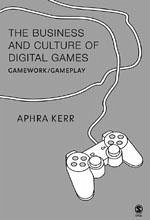Nicht lieferbar

The Business and Culture of Digital Games
Gamework/Gameplay
This book explores the lifecycle of digital games. Drawing upon a broad range of media studies perspectives with aspects of sociology, social theory and economics, Aphra Kerr explores this all-pervasive, but under-theorised, aspect of our media environment. Written as an introductory text for media and game students this book aims present an overview of industry and scholary work on who makes games, where they get made, what kind of media and cultural form they are and who plays them and where. The Business and Culture of Digital Games looks at: - games as a new media form; - the design, devel...
This book explores the lifecycle of digital games. Drawing upon a broad range of media studies perspectives with aspects of sociology, social theory and economics, Aphra Kerr explores this all-pervasive, but under-theorised, aspect of our media environment. Written as an introductory text for media and game students this book aims present an overview of industry and scholary work on who makes games, where they get made, what kind of media and cultural form they are and who plays them and where. The Business and Culture of Digital Games looks at: - games as a new media form; - the design, development and marketing of games; - the use of games in public and private spaces. Combining a theoretical and empirical analysis of the production, content and consumption of computer games, this book will be of interest to many students of media, culture and communication.











